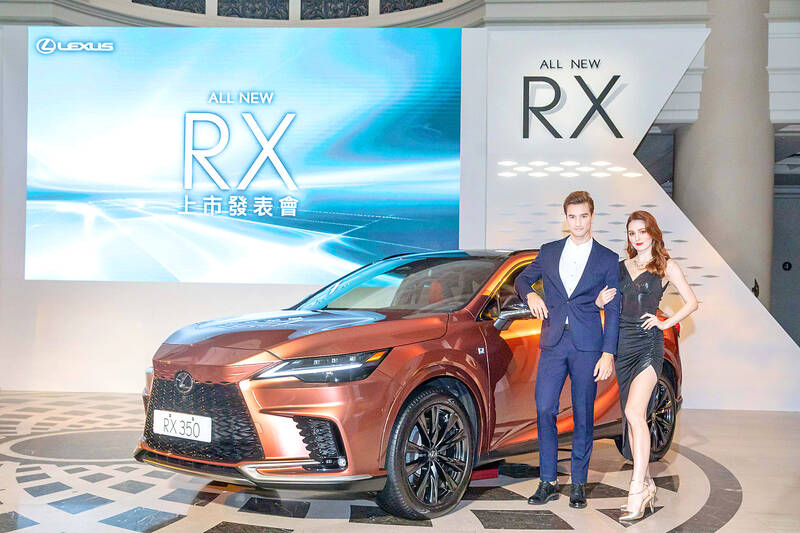New vehicle sales contracted 4.5 percent annually last year to 429,731 units as the auto market was hit by an extended chip crunch and gloomy consumer sentiment, leading to production disruptions and weak sales, market researcher U-Car.com said yesterday.
For the whole of last year, Hyundai Motor Co outperformed the market, registering annual growth of 14.7 percent by selling 15,394 vehicles, U-Car data showed.
The South Korean firm was the only one of the top 10 automakers that managed to grow vehicle sales during a year of uncertainty, U-Car said.

Photo: Amy Yang, Taipei Times
Last year, Hyundai gained a market share of 3.6 percent. Nan Yang Industries Co (南陽實業) helps distribute Hyundai vehicles in Taiwan.
Hotai Motor Co (和泰汽車), which distributes Lexus and Toyota models in Taiwan, kept its top position, seizing a 33.2 percent share of the nation’s passenger vehicle market, up from 32.6 percent in 2021.
However, Hotai failed to counter the unfavorable macro environment and saw sales slide 2.7 percent year-on-year to 142,761 vehicles last year, as chip shortages cut output.
Toyota’s Corolla Cross was the best-selling vehicle last year for the second year in a row, with 39,585 units sold, Hotai said in a statement.
Hotai reported a setback in the commercial car market with sales of Toyota and Hino brands plunging 18.5 percent to 23,130 units last year from 28,378 units in 2021.
The distributor blamed the COVID-19 pandemic, chip constraints and Russia’s invasion of Ukraine for the decline.
In the passenger vehicle market, Tesla Inc sold a total of 11,575 Model 3 and Model Y units last year, making it the first electric vehicle maker to sell more than 10,000 units in Taiwan in a year, U-Car said.
Overall, last year’s new vehicle sales fell short of Hotai’s expectation of 430,000 units, but exceeded the estimate of Yulon Motor Co (裕隆汽車), which tends to be more pessimistic.
Looking ahead, new vehicle sales this month are expected to dip 6 percent year-on-year to about 38,000 units, due to their being little improvement in chip supply and fewer working days due to the Lunar New Year holiday, Hotai said.
That would represent a monthly reduction of 9.2 percent from 41,854 units sold last month.
New vehicle sales last month expanded 4 percent annually and 5.5 percent from a month earlier, fueled by strong year-end sales promotions, U-Car said.
The arrival of Tesla vehicles also drove growth, it added.
Tesla became the second-largest vehicle brand last month with sales of 4,073 units, surging 703 percent from November, while Mitsubishi Motors Co followed with 2,762 units sold, up 22.5 percent from a month earlier, U-Car data showed.

ADVANCED: Previously, Taiwanese chip companies were restricted from building overseas fabs with technology less than two generations behind domestic factories Taiwan Semiconductor Manufacturing Co (TSMC, 台積電), a major chip supplier to Nvidia Corp, would no longer be restricted from investing in next-generation 2-nanometer chip production in the US, the Ministry of Economic Affairs said yesterday. However, the ministry added that the world’s biggest contract chipmaker would not be making any reckless decisions, given the weight of its up to US$30 billion investment. To safeguard Taiwan’s chip technology advantages, the government has barred local chipmakers from making chips using more advanced technologies at their overseas factories, in China particularly. Chipmakers were previously only allowed to produce chips using less advanced technologies, specifically

The New Taiwan dollar is on the verge of overtaking the yuan as Asia’s best carry-trade target given its lower risk of interest-rate and currency volatility. A strategy of borrowing the New Taiwan dollar to invest in higher-yielding alternatives has generated the second-highest return over the past month among Asian currencies behind the yuan, based on the Sharpe ratio that measures risk-adjusted relative returns. The New Taiwan dollar may soon replace its Chinese peer as the region’s favored carry trade tool, analysts say, citing Beijing’s efforts to support the yuan that can create wild swings in borrowing costs. In contrast,

VERTICAL INTEGRATION: The US fabless company’s acquisition of the data center manufacturer would not affect market competition, the Fair Trade Commission said The Fair Trade Commission has approved Advanced Micro Devices Inc’s (AMD) bid to fully acquire ZT International Group Inc for US$4.9 billion, saying it would not hamper market competition. As AMD is a fabless company that designs central processing units (CPUs) used in consumer electronics and servers, while ZT is a data center manufacturer, the vertical integration would not affect market competition, the commission said in a statement yesterday. ZT counts hyperscalers such as Microsoft Corp, Amazon.com Inc and Google among its major clients and plays a minor role in deciding the specifications of data centers, given the strong bargaining power of

TARIFF SURGE: The strong performance could be attributed to the growing artificial intelligence device market and mass orders ahead of potential US tariffs, analysts said The combined revenue of companies listed on the Taiwan Stock Exchange and the Taipei Exchange for the whole of last year totaled NT$44.66 trillion (US$1.35 trillion), up 12.8 percent year-on-year and hit a record high, data compiled by investment consulting firm CMoney showed on Saturday. The result came after listed firms reported a 23.92 percent annual increase in combined revenue for last month at NT$4.1 trillion, the second-highest for the month of December on record, and posted a 15.63 percent rise in combined revenue for the December quarter at NT$12.25 billion, the highest quarterly figure ever, the data showed. Analysts attributed the